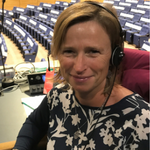Our speakers:
| Estelle Valensuela |
Jaquelina Guardamagna |
Andrew Simpson |
Morag Neath |
Zora Jackman |
| Jo Drugan | Sue Leschen | Mike Orlov |
 Keynote: When the art of interpreting meets sports
Keynote: When the art of interpreting meets sports
Come and join us on 25 March, 2023 at the Chartered Institute of Linguists Conference for an exciting and lively journey with FIFA's Senior Interpreting Manager Estelle Valensuela who, with her 20-year experience in the language industry, will shed light on the organisational structure of interpreting services in the world of football, while sharing her recent and exciting memories from the most recent World Cup in Qatar.
Speaker: Estelle Valensuela
When she is not backstage, running the complexity of football game interpreting, Estelle also knows how to be in the limelight, on stage, while she pursues her passion for music. Don’t miss the opportunity to listen to Estelle!

Interpreters as relationship builders: Strategies for developing long-term connections with clients
As interpreters we excel at bringing people together but may fail at building strong and lasting relationships with our own clients.
In this presentation we will focus on the essentiality of developing connections which can lead to increased loyalty, repeat business and positive word-of-mouth recommendations.
By delving into real-world scenarios and the philosophy of personalisation, you will be equipped with actionable strategies, and practical takeaways that can be implemented immediately, such as:
- Tips to “interpret” and exceed your clients’ expectations
- How to stay top of mind when they need your services
- Attitudes and communication techniques that keep your clients coming back.
Gain an understanding of these key elements and you will feel ready to build successful relationships with those clients that are a perfect fit for the services you offer.
Speaker: Jaquelina Guardamagna
Jaquelina Guardamagna, FCIL, CL, IAPTI, is an English-Spanish certified translator and consecutive interpreter with 14 years of experience working in culturally diverse contexts, helping to create connections between British and Latin American companies and individuals through the power of languages. She is a Fellow member of the Chartered Institute of Linguists, a member of Council and former Chair of ‘The Linguist’ Editorial Board.
She is the founder and director of Translator in London Ltd., and was recognised by the F:Entrepreneur campaign as one of the #Ialso100 UK female entrepreneurs in 2020.
 The future of interpreting standards
The future of interpreting standards
In this presentation, Mike Orlov, Executive Director of NRPSI, will give his insights on:
- What has changed and what has stayed the same in the last few decades, and what has changed during the pandemic
- What you see as the next big changes: remote interpreting, technology assisted translation, offshoring – what you see as the risks and benefits of each of these
- What this changing landscape means for standards and ethics
- What this means for registers, regulation and oversight
- How you imagine public service interpreting might (ideally) look in 2030
Speaker: Mike Orlov
A Fellow of the Institute of Leadership and Management (FInstLM), consultant, facilitator, mentor, business coach, trainer, public speaker as well being a published business writer, Mike is passionate about the role of professional public service interpreting and translating and is committed to lobbying and advocating for greater recognition, awareness and appreciation of language-service professionals serving the public and the public-sector in the UK.

Morag Neath will provide an overview of trends in interpretation at the European Commission. She will address the recruitment needs, the profile being sought and the recruitment process. She will also touch on the current challenges facing the conference interpreting profession.
Speaker: Morag Neath
Morag Neath graduated from Bath University with a BA Hons in European Studies with French and Italian in 1994 and the following year completed the Postgraduate in Interpreting and Translation. She began her professional career as a staff interpreter at the Schengen Secretariat in 1996 and joined the English booth at DG SCIC, at the European Commission, in 1999 where she has worked ever since. She has added Portuguese, Dutch and Spanish to her language combination. After 5 years as Deputy Head of the English Interpretation Unit, she was appointed Head of Unit in January 2022.

My recent research, starting with interpreters then mushrooming to understand different emerging areas of work for linguists, brought home to me how established professional roles and boundaries are being challenged. One example is the ‘embedded linguist’ in police/Home Office modern slavery operations. This type of work will be outlined along with some other challenges to role types and expectations of interpreters, by clients, trainers, and peers. I will explore how increasingly blurred boundaries encourage us to reflect on traditional approaches to professional conduct and ethics.
Speaker: Jo Drugan
 Interpreter conundrums – working in a public facing role
Interpreter conundrums – working in a public facing role
As a French interpreter and translator specialising in the legal setting, I’ve worked for a number of law firms, in court and with government bodies in the UK and France. In 2013, I was contacted by a premier league football club to work in house as interpreter for a large contingent of French players. For a handful of years I worked as French interpreter for a number of other clubs; however, far from the glitz and glamour often associated with working as interpreter in the sports setting, there are a number of ethical conundrums faced when working for a paying client in a setting where interviews have to go through club approval.
How can you work for live press conferences as a ‘glass wall’ interpreter - faithfully interpreting every word - when the club often has some restrictions on what they wish and do not wish to be discussed? To what extent should the interpreter actively omit or change a message to suit the requirements of the party commissioning the service as briefed?
In this talk I shall focus on these issues which are present on a daily basis for interpreters working in the sport setting and look closely at the ethics involved from a professional standpoint as well as providing real life experience, some tools I have developed to take away and apply, and also leading to some opportunity for self-reflection or group discussion regarding ethics in such a high profile public setting particularly with regard to sports player media interviews and press conferences.
Speaker: Andrew Simpson
 Facilitating reflective practice groups for public service interpreters
Facilitating reflective practice groups for public service interpreters
Interpreters working in public service settings are frequently exposed to traumatic experiences and ethical dilemmas. Whilst service providers may have their own support groups or supervision, interpreters often find it difficult to access an opportunity to share their experience in a safe environment, as they are typically self-employed and bound by confidentiality. In this presentation, Zora Jackman will reflect on her own experience and will explore the concept of training interpreters in facilitation skills to be able to support colleague interpreters through formal reflective practice groups, as well as the need and provision of supervision of their facilitation.
Speaker: Zora Jackman
Zora Jackman, DPSI MCIL MITI is a qualified public service interpreter with over 15 years’ experience. She has been a tutor of public service interpreting courses at Cardiff University for the past 12 years. In the last 3 years she has been facilitating reflective practice support groups to support interpreters dealing with ethical dilemmas and emotionally difficult situations.
 Interpreters and vicarious trauma - is the job getting to us?
Interpreters and vicarious trauma - is the job getting to us?
Some jobs come at a price to our mental health when we have to interpret traumatic issues experienced by clients. The price we may have to pay is the effect on our own well being - either on a one - off, short - term or even long term basis whereby we are now ourselves suffering secondary trauma as a result. This can be particularly significant where we have personally experienced the same or at least very similar issues in our own lives and especially where there is prolonged and ongoing exposure to trauma which we may not be dealing with in an effective way . Unfortunately there is still very little out there by way of inexpensive formal support for us compared to the type of in house support that is available to some of the other professionals we work with such as the police. Notwithstanding this, some interpreters are now training as counselors and are beginning to set up dedicated counselling and support services within their own freelancer groups and organisations. Of course the other issue that has to be taken into account is the fact that we are bound by confidentiality in most cases.
This session will be facilitated by lawyer linguist Sue Leschen who has herself experienced vicarious trauma on numerous occasions. The session will comprise of a short presentation followed by a structured discussion by colleagues present of the issues involved and (hopefully) of practical solutions.
Speaker: Sue Leschen


